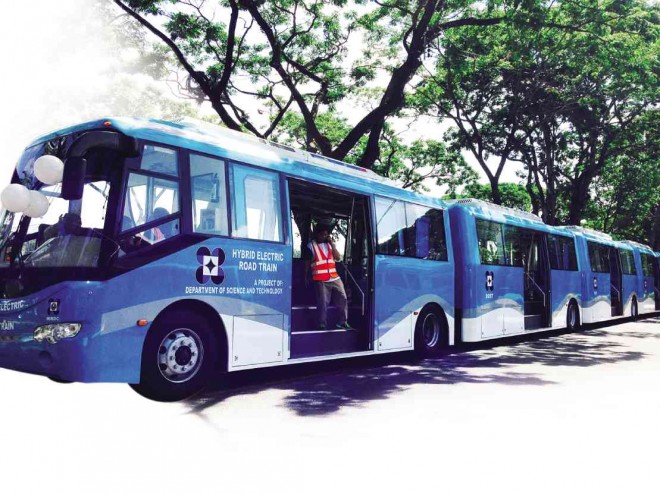
DEMO units of a “road train” designed and built by Filipinos are given test runs at the Clark Freeport. The Department of Science and Technology is offering the road trains as a solution to the country’s mass transit problems. TONETTE OREJAS/INQUIRER CENTRAL LUZON
CLARK FREEPORT—A Filipino-made “road train” using electricity-charged batteries and diesel made its first test run here on Thursday, months before the Department of Science and Technology (DOST) rolls it out on the streets of Metro Manila and this free port.
Robert Dizon, science assistant secretary, led the 3-kilometer demonstration ride of the road train around the Clark parade ground and nearby streets.
The road train, consisting of five interconnected coaches that can carry a maximum of 65 passengers each, costs P45 million (about P9 million per coach), Dizon said.
This type of vehicle, he said, is called a hybrid because it is fueled by electricity and diesel. The road train, which runs at 50 km per hour, is touted to be eco-friendly because it emits less smoke.
One of the passengers, Arthur Tugade, Clark Development Corp. president, said he experienced a smooth ride.
Tugade said he wanted a two-coach road train to be part of Clark Freeport’s integrated transport system by the end of this year.
“We are filled with pride. [The DOST is doing its mandate] to contribute to the growth of the country,” Dizon said during a program held for the test run.
The demonstration ride started the National Science and Technology Week scheduled in July. Dizon said the project is part of the DOST’s commitment to support the productivity and global competitiveness of local metals, engineering and allied industries.
Filipino engineers designed the train using locally available parts and metals. It is presented as one of DOST’s answers to the mass transportation problem in Metro Manila.
Clark was chosen for the test because of its good road network.
The road train project had been divided to five phases starting 2012. Trial runs have been held since August last year, DOST reports said.
Rommel Corona, supervising science research specialist of the DOST, said the building of the prototype started in 2012. The project’s Phase 5 entails mass production of the road trains. Tonette Orejas, Inquirer Central Luzon